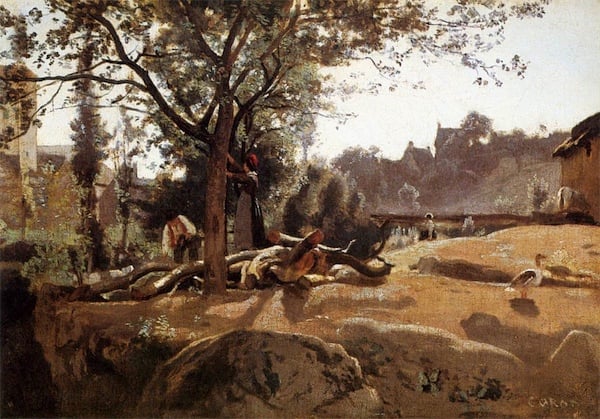
Demain, dès l’aube, à l’heure où blanchit la campagne,
Je partirai. Vois-tu, je sais que tu m’attends.
J’irai par la forêt, j’irai par la montagne.
Je ne puis demeurer loin de toi plus longtemps.
Je marcherai les yeux fixés sur mes pensées,
?
Sans rien voir au dehors, sans entendre aucun bruit,
Seul, inconnu, le dos courbé, les mains croisées,
Triste, et le jour pour moi sera comme la nuit.
Je ne regarderai ni l’or du soir qui tombe,
?
Ni les voiles au loin descendant vers Harfleur,
Et quand j’arriverai, je mettrai sur ta tombe
Un bouquet de houx vert et de bruyère en fleur.
Tomorrow, at dawn, as the countryside brightens,
I will leave. You see, I know you’re waiting for me.
?
I’ll travel by way of forest, I’ll travel by way of mountain.
I can’t stay away from you any more.
I’ll walk with my eyes fixed on my thoughts,
Without seeing anything beyond them, without hearing any sound,
Alone, unknown, back bent, hands crossed,
Sad, and the day for me will be like the night.
I will see neither the golden evening that descends,
Nor the sails in the distance that move towards Harfleur,
When I arrive, I shall place on your tomb
A bouquet of green holly and of flowering heather.
—Victor-Marie Hugo, Demain, dès l’aube (1847) from Les Contemplations (1856) contained in Œuvres poétiques, vol. 2, pp. 657-58 (P. Albouy ed. 1967)(S.H. transl.)
Victor Hugo may be the premier French poet of the Romantic movement, but when it came to music, he encouraged and supported contemporary composers while making clear that his heart was lodged firmly in the past. He had a life-long fascination for Claudio Monteverdi and repeatedly wrote about the master who built the bridge from Renaissance polyphony to the early Baroque. Still, Hugo’s writings inspired many of his contemporaries. This poem, written at the anniversary of the death of Hugo’s beloved daughter, has the same alternating tones of sadness and lucidity that we find in the Consolations of Franz Liszt, which was composed at the same time and was plausibly influenced by Hugo’s poetry. Listen to Consolation No. 3 in a performance by Arthur Rubinstein.


